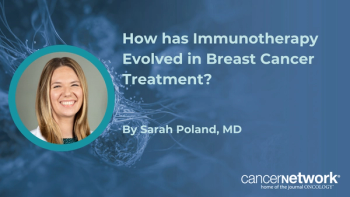
Oncology NEWS International
- Oncology NEWS International Vol 6 No 8
- Volume 6
- Issue 8
Breast and Arm Sensations Are Common After Breast Surgery
NEW ORLEANS--Three fourths of patients experience significant physical sensations after breast cancer surgery. For many women, these are still present years later, and many have long-term arm morbidity as well, researchers reported at the Oncology Nursing Society's 22nd Annual Congress.
NEW ORLEANS--Three fourths of patients experience significant physicalsensations after breast cancer surgery. For many women, these are stillpresent years later, and many have long-term arm morbidity as well, researchersreported at the Oncology Nursing Society's 22nd Annual Congress.
"If not adequately prepared preoperatively, patients often interpretbreast sensations as an indication that something is wrong, adding uncertaintyto an already stressful event," said Roberta Baron, RN, of MemorialSloan-Kettering Cancer Center.
Ms. Baron and her colleague Dr. Patrick Borgen surveyed 132 patientsduring their first postoperative month, using a breast sensation assessmentscale.
Seventy patients had breast-conserving surgery, 53 had modified radicalmastectomy, and 9 had total mastectomy. Of the 62 mastectomy patients,25 had reconstructive surgery.
Sensations of numbness, pulling, tenderness, soreness, or tightnesswere each reported by at least 70% of patients. Ms. Baron stated that aching,tingling, stiffness, or pain were reported by a little more than half ofthe patients surveyed.
When present, the sensations that were most often described as "quitea bit" or "very much" distressing included cramping (31%),hardness (28%), pain (28%), and sharpness (26%), Ms. Baron said. Sensationsdescribed as sharp, penetrating, burning, numb, and tight were rated as"severe" or "very severe" in more than 30% of caseswhere these symptoms were present.
When asked what brings the sensation on, 88% of patients ascribed itto movement, 71% to position, and 63% to exercise. When asked what alleviatesthe sensation, a change in position was noted by 64% of patients and medicationby 49%, while 34% said that the sensations disappear on their own.
The researchers concluded that patients need to be educated preoperativelythat such sensations may occur. "This may help alleviate some of theemotional distress associated with these symptoms," Ms. Baron said.
Symptoms Remain Years Later
Margaret M. Hull, PhD, RN, of the University of Maryland at Baltimore,reported that years after surgery, distressing sensory changes may stillbe present but may be ignored by physicians, who often don't ask aboutthem or who suggest that nothing can be done about them.
Her survey included 17 patients evaluated 2 to 25 years after breastcancer surgery. Nine had a modified radical mastectomy, six had a bilateralmastectomy, two had lumpectomy and radiation, and eight had reconstruction.The evaluation included an in-depth interview and a physical therapy assessmentof seven measures of function.
The findings suggested mild to moderate deficits in range of motionand grip strength, and the presence of distressing sensory changes, pain,and lymphedema years after treatment.
Sensory changes included paresthesia, hyperesthesia, dysesthesia, andallodynia. Palpation of tender points found 15 of 22 areas were tendermore than 60% of the time. Many women had even experienced pain, swelling,and throbbing.
"At times, even basic activities such as dressing and groomingmust be altered to accommodate arm problems," Dr. Hull said. "Mostwomen have limited knowledge of specific precautions for arm care, andthus are at risk for serious complications, such as cellulitis."
Articles in this issue
over 28 years ago
Two-Step Approach Urged to Avoid High Tech, Wild Deathover 28 years ago
Health Insurance Premiums Tax Proposedover 28 years ago
ODAC Votes Yes on Taxol for Kaposi's Sarcomaover 28 years ago
Five Principles Help Resolve Ethical Dilemmas in Careover 28 years ago
Ovarian Cancer Survivors Form National Coalitionover 28 years ago
Photodynamic Therapy Used in Nonmelanoma Skin Cancerover 28 years ago
Increased Numbers of Nevi Can Predict Risk of Melanomaover 28 years ago
With Genetic Tests, Informed Consent Enters Psychosocial Realmover 28 years ago
Cryoablation May Have Limited Role in Prostate Cancer Treatmentover 28 years ago
Americans Not Convinced of Value of Watchful WaitingNewsletter
Stay up to date on recent advances in the multidisciplinary approach to cancer.














































